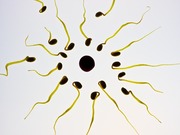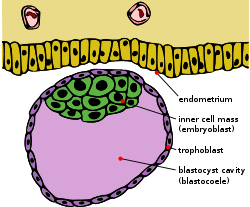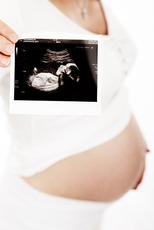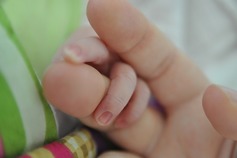 Image: Pixabay
Image: Pixabay Many religious ethicists, for example Roman Catholics, argue that the clearest and most logical point to say that life has begun is at the moment of conception when egg and sperm fuse together. This is when the complete genetic make-up of an individual is in place and thus a unique human has been made. The problem with choosing this moment is that the embryo is likely to never be born (1 in 5 embryos never even implant in the lining of the uterus) and arguably this is only a potential life at this stage. It is just a bundle or rapidly dividing cells with no sentience (ability to feel pleasure or pain) or autonomy.
 Image: Wikipedia.en
Image: Wikipedia.en After five days the fertilised egg becomes a blastocyst becomes a cell with differentiated cells - cells that perform different functions - they have a cell wall and an inner cell mass that will become the embryo. By day 9 this blastocyst has become so specialised that it can no longer divide in two and become identical twins. Some therefore at this point argue that the life has begun as before this there could have been monozygotic twins. This is an interesting point in the pregnancy and is the reason why the Church of England argues that it is OK to carry out experiments on embryos before this day - but ultimately it could be argued it is still a potential life and not able to survive independently.
 Image: Pixabay
Image: Pixabay Before week 22 the foetus has all of the organs and structures of the body formed - it is just a case of growing these further. However if the foetus was to be born or removed from the womb at this point it would not survive. The odds start to change at about week 22 there is a 10% chance of survival. This is clearly not much of a chance and would have to brought about with extreme neo-natal care - never-the-less this is the first chance that a foetus has to survive. The chances of survival increase day by day so that by week 25 50% of babies survive and it is 95% by week 35.
Whilst this is the reason why the law governing abortion was set at 24 weeks (unless there is a serious medical reason) it can be argued that at this stage the baby will require such intensive care that it should not be considered as a practical justification
 Image: Pixabay
Image: Pixabay Most pregnancies result in a natural birth at some point between 38 and 42 weeks. The baby simply becomes too big for the womb and has to be born. Babies that go this far into term have a very good chance of survival independently of their mother (>98%) and certainly most people have no problem with suggesting that they are alive at this point (interestingly Peter Singer has made the case that even when born a baby does not have the right to life as it has so much development still to complete and is still utterly dependent on a carer for its survival).
When is a foetus a life? There are many more potential points that could be considered than I have discussed here - for example when the foundations of the nervous system have developed on day 20; on day 40 when brain waves can be detected; or in week 8 when all of the organs have been formed. The debate will of course continue to rage on.
A final thought is that students I teach are often surprised how developed the foetus is early on in the pregnancy - by week 24 and the point of viability the foetus has been essentially “complete” for 16 weeks. Many are not as happy with 24 weeks being the social abortion limit having learnt this information. I do not know when we should class a foetus as living and independent - but I do think that 24 weeks is too late. What do you think?


 RSS Feed
RSS Feed
